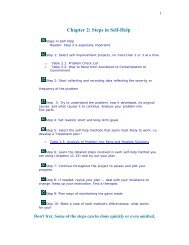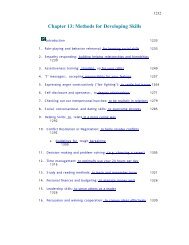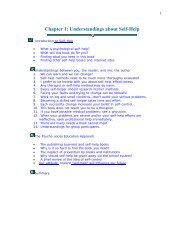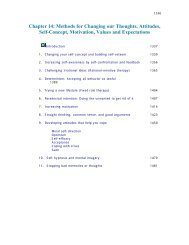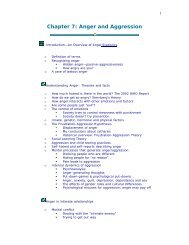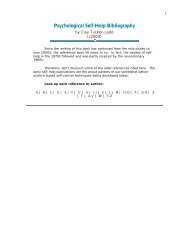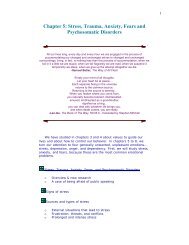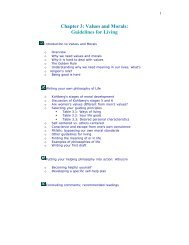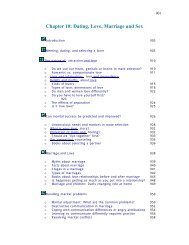Methods for Changing Behaviors - Psychological Self-Help
Methods for Changing Behaviors - Psychological Self-Help
Methods for Changing Behaviors - Psychological Self-Help
Create successful ePaper yourself
Turn your PDF publications into a flip-book with our unique Google optimized e-Paper software.
Steps<br />
· To strengthen the tendency of a desirable habit (or thought or feeling) to<br />
occur again in the future.<br />
· To create a new and better response by (a) shaping, i.e. rewarding some<br />
behavior that approximates the desired behavior (keep rewarding<br />
changes in the desired direction until the desired behavior occurs), or (b)<br />
rewarding a substitute behavior, e.g. if one has a whiny, pessimistic<br />
roommate, one could reward pleasant, optimistic comments.<br />
· To rein<strong>for</strong>ce the reduction of an unwanted response (cutting down a bad<br />
habit).<br />
· To sweeten up an unpleasant but necessary task (the usual employment<br />
situation).<br />
· To make up <strong>for</strong> the loss of harmful pleasures, e.g. pride in your looks can<br />
make up <strong>for</strong> giving up rich delicious food, fun times with an athletic team<br />
can make up <strong>for</strong> fun times with drug-using friends, etc.<br />
· To discover and increase intrinsic satisfaction: (1) to initiate an activity<br />
that you may discover to be naturally satisfying or (2) to associate a<br />
reward with a task, e.g. studying, so that the task becomes more<br />
pleasurable (see method #15).<br />
STEP ONE: Identify the desired behavior in very specific terms;<br />
Set subgoals (daily, weekly, and monthly) as well as final<br />
goals.<br />
First of all, it is hard to improve oneself if one doesn't know exactly<br />
what to do...and when and where to do it. So, one has to convert<br />
vague goals, like "I want to get organized" or "I want to be more<br />
loving" or "I wish I had less of a temper," into specific desired<br />
behaviors, like make up a daily schedule, talk and do fun things<br />
together 30 minutes every day, and try specific methods from chapter<br />
7 <strong>for</strong> reducing my anger.<br />
Since positive rein<strong>for</strong>cers are supposed to primarily strengthen the<br />
responses given during the previous few seconds or, at most, minutes<br />
(unless the situation is recreated in one's mind), there<strong>for</strong>e, the to-berewarded<br />
response must be brief, easily identified, and very clearly<br />
associated in your mind with the payoff. Otherwise, how will you know<br />
when to give the reward at the right moment?<br />
Likewise, since you expect gradual improvement in your behavior,<br />
you need to set realistic daily, weekly, and monthly subgoals which will<br />
be rein<strong>for</strong>ced as soon as they occur. Examples: For the first week of<br />
jogging, you might decide to jog 1/2 a mile every day. For the second<br />
week, 3/4's of a mile daily. For the third week, a mile a day. The<br />
rewards should be given right after running. If you want to be more<br />
assertive, the behavior needs to be developed gradually, just like<br />
jogging. So, set subgoals and final goals, which will be used in the<br />
contract in step 3.<br />
Also, since the environment determines much of our behavior, it<br />
may be helpful to specifically prescribe the situation in which the<br />
desired behavior will occur. Watson and Tharp (1972) suggest<br />
1127



